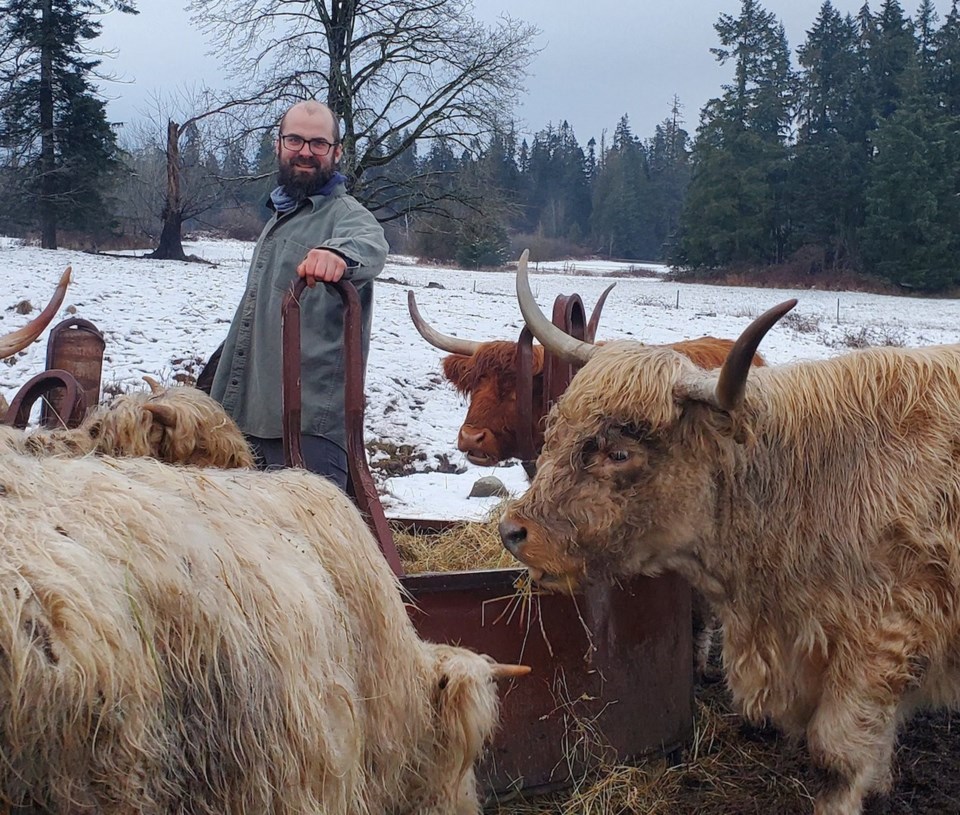Canadian scientists are investigating whether regional seaweeds might be the new superfood for cows, and battle in the process.
Belchy cattle are a big source of methane, a that traps approximately 80 times more heat than carbon dioxide over 20 years.
Methane makes up about 40 per cent of , with 90 per cent emanating from cattle and sheep.
So scientists are eager to find ways to reduce methane emissions through possible changes to cows’ diets, and seaweed has great potential, said Spencer Serin, a researcher affiliated with North Island College (NIC) and Cascadia Seaweed on Vancouver Island.
Methane is produced in the rumen, or upper stomach, of cattle as they digest their feed. Created during the process of enteric fermentation, as microbes in the cow’s tummy predigest fibre and starches, methane is released as the cattle burp and exhale.
In a single year, a dairy cow can produce methane from a mid-sized vehicle driven 20,000 kilometres. Typically, there are close to 1.9 million heads of dairy cattle each year.
Scientific research elsewhere in the world has found that certain seaweeds by as much as 80 per cent.
However, Serin said, definitive studies to date involve seaweeds that tend to grow in warmer waters.
So, it’s really important to start examining B.C. seaweeds that are abundant or easily grown and could be beneficial for cattle, he said.
“It’s definitely exciting research to pursue,” Serin said.
“But if we’re talking about improving feed efficiency or decreasing the climate impact of animal husbandry, we can’t be importing seaweed from California, Australia or Hawaii to Alberta or B.C.”
Serin has done some initial research on an invasive seaweed found on the B.C. coast, Mazzaella japonica, which is abundant and easy to source, who was feeding it to his cows.
Research is ongoing to evaluate anecdotal evidence that the red algae may reduce methane, improve the quality or healthfulness of meat, or improve the digestive process of cattle, he said.
But research opportunities to investigate the more than 500 different species of algae on the West Coast are expanding rapidly , he added.
Serin is collaborating with Cascadia Seaweed to identify good candidates for cultivation, he said.
Cascadia chair Bill Collins said exploring the potential of B.C. seaweeds as feed for cattle is a big focus for the company.
“Seaweed is of significant value in the fight against climate change,” said Collins, adding its possible use in cattle feed has “truly gigantic potential.”
“Every week, we’re seeing another report or newspaper article about the prospect of feeding cattle or cows seaweed,” Collins said.
“If we can deliver seaweed in the volumes necessary, it’s possible we can massively reduce methane emissions from agriculture.”
Agriculture Canada scientist Wade Abbott agreed that seaweed as a cattle feed additive has vast potential, but tapping Canadian seaweeds for the job is still in the early stages.
“Where we're at right now is extremely promising, and it's kind of at a fever pitch of excitement,” said Abbott, “But it’s really in its infancy.”
Abbott, who specializes in how gut flora metabolizes food, has said his focus is largely in determining if a cow can actually digest specific types of seaweed.
There’s a lot of focus on identifying seaweeds to reduce methane, but there’s also great interest in what other sustainable or nutritional benefits seaweed might offer, he said.
“As far as using seaweed as a nutritional component, I think now we can say we know that there are bacteria capable of digesting some of them.”
The next step will be identifying the most promising seaweeds as quickly as possible in a lab situation, using artificial rumens, before trialing them with live animals, Abbott said.
Given how quickly some seaweeds grow, and the fact they don’t require water or fertilizer, they could offer sustainability benefits over traditional land crops. And Canada has the advantage of having three coasts to grow it on.
“It’s also the classic feed versus food debate,” Abbott added. “Where the land required to grow feed could have been used to feed people.”
But cattle farmers on the Prairies are likely going to be resistant about using seaweed from the coasts in lieu of traditional feeds growing in the immediate vicinity, he added, unless nutritional benefits can be demonstrated.
“We can consider it potentially as an alternative form of feed in the future, but we also still have to weigh all the positives and negatives as it relates to climate change and sustainability,” Abbott said.
“So we just have to temper our claims until the science catches up.”

